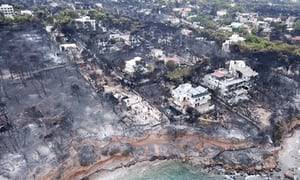At an emergency meeting of his cabinet, he acknowledged that the tragedy had left him wondering whether his government could have done more to prevent such loss of life. “This is a difficult moment, perhaps the heaviest of our term in office,” he said. “The dead cannot talk, but the least we can do in their memory is to show respect for the truth.
“Before the cabinet, and the Greek people, I want to assume full responsibility for the tragedy … I regard this as self-evident for the prime minister of a country to do – and I call on you to also assume responsibility, no matter how hard.”
The leftist-led coalition has been left reeling as criticism of its handling of the disaster mounted. Tsipras, who assumed power in 2015, promising to radically change the way Greece was governed, admitted that he had been possessed by “mixed feelings of pain, devastation and anguish … anguish as to whether we acted as we should have done, if we responded correctly in these critical hours, and if we could have done anything more to save even one more of the souls who died unjustly”.
The prime minister has not appeared in public since rushing back from Bosnia-Herzegovina on Monday when it became clear that wildfires were raging out of control barely 25km outside the capital. His absence has reinforced the outcry over the response to a disaster now regarded as Greece’s worst in modern times. With the death toll rising, the Queen joined other international heads of state in expressing her condolences this week.
Addressing his sombre and downcast ministers, Tsipras said the disaster had left him fearing that out of an “instinct of self-preservation”, members of his government could have “made too many excuses to lessen responsibility” – even if the political opposition was also exploiting the disaster.
But Tsipras’ coalition provoked further fury on Friday when the civil protection minister, Nikos Toskas, told a hastily arranged news conference that while he suspected that arson had caused the fires, he had found no indication “of grave errors” in the way they had been handled.
On Thursday, the defence minister, Panos Kammenos, was heckled as he inspected the charred remains of buildings in Mati, the seaside village almost entirely obliterated by the conflagration and where most of the deaths occurred.
Many victims are now known to have died after becoming trapped in vehicles as they tried to escape the fires. But with gale-force winds of up to 124km/h fanning the flames, the government has insisted there was no time to evacuate people from areas whose escape routes were blocked by illegally built summer homes.
In a special report, experts from the University of Athens’ faculty of geology and geo-environment described Mati as a “fire-trap”, arguing that the resort’s anarchic construction had rendered fire safety impossible in an area well known for summer blazes.
Many victims are now known to have died after becoming trapped in vehicles as they tried to escape the fires. But with gale-force winds of up to 124km/h fanning the flames, the government has insisted there was no time to evacuate people from areas whose escape routes were blocked by illegally built summer homes.
In a special report, experts from the University of Athens’ faculty of geology and geo-environment described Mati as a “fire-trap”, arguing that the resort’s anarchic construction had rendered fire safety impossible in an area well known for summer blazes.
More about: #Greece
















































